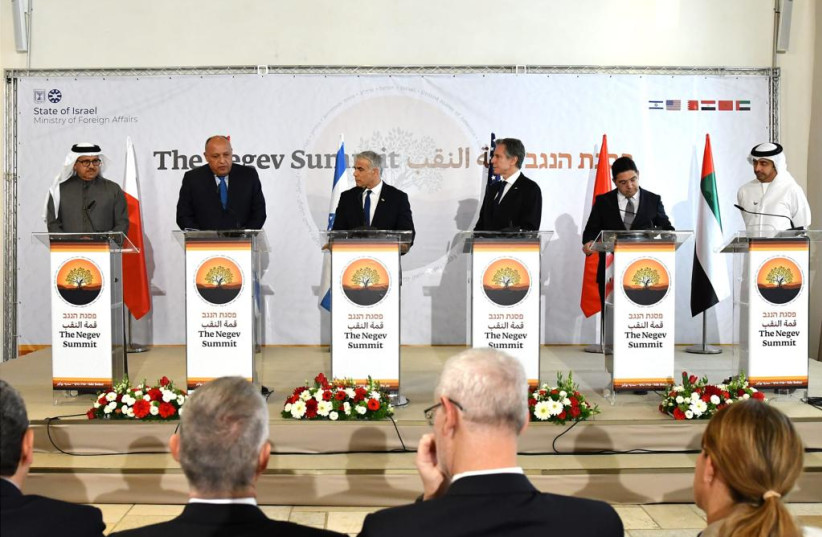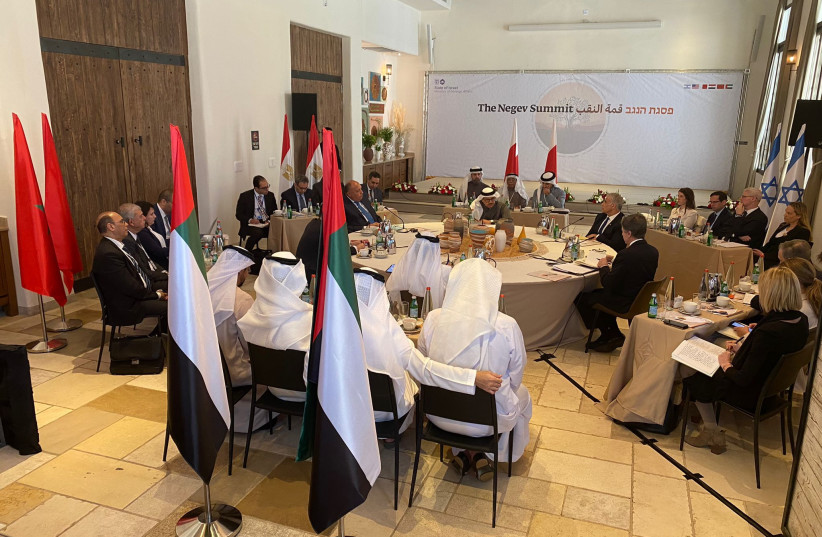Cooperation between Israel, the US, Bahrain, Egypt, Morocco and the United Arab Emirates should strike fear in Iran, Foreign Minister Yair Lapid said Monday at the Negev Summit.
“The shared capabilities we are building intimidate and deter our common enemies, first and foremost Iran and its proxies,” he said. “They certainly have something to fear.”
The way to stop those enemies “is not hesitation and being conciliatory; rather, it is determination and strength,” he added.
The Negev Summit, Lapid’s brainchild, was organized within a matter of days, as negotiations between world powers and Iran to return to the 2015 nuclear deal were on hold but appeared to be nearing their end.
Israel and Gulf states have been dismayed at the expected results of the talks. The UAE and Saudi Arabia were especially disappointed at Washington’s response to attacks on their countries by the Iran-backed, Yemen-based Houthis, such as those that occurred over the weekend in Jeddah.
Lapid, US Secretary of State Antony Blinken and their counterparts – Sameh Shoukri from Egypt, Abdullatif Al Zayani from Bahrain, Abdullah bin Zayed from the UAE and Nasser Bourita from Morocco – gathered in Sde Boker on Sunday and Monday.

Bilateral meetings between Lapid and each of the foreign ministers, as well as the meeting of all six together, focused on what his office called “a regional security architecture that will build deterrence against threats from the air and sea.”
Blinken said the countries represented at the summit “will also work together to confront common security challenges and threats, including those from Iran and its proxies.”
Zayani spoke about “Houthi terrorist attacks on civilian energy infrastructure and attacks by Hezbollah... and the need to resolve the Iranian nuclear file.
“We need to put into action the principles behind” the Negev Summit, he said. “We need to establish genuine, sustainable coexistence and interdependence between participants and genuine networks of cooperation and trust to advance our common security and prosperity, demonstrating to the whole region what can be achieved by working together.”
Behind closed doors, Blinken clarified that the US had not made a final decision regarding the removal of Iran’s Islamic Revolutionary Guard Corps from its Foreign Terrorist Organization list, which all five of the other countries represented strongly oppose.
Foreign Ministry Deputy Director-General for the Middle East Oded Yosef on Monday said the US and the Abraham Accords countries had moved toward greater understanding on the issue of the IRGC and Iranian proxies.

“What stood out a lot today is that no one ignored the gaps that existed” between those present, he said. “But on the other hand, there was a clear understanding that the gaps are significantly smaller.”
Speaking in Sde Boker, where Israel’s first prime minister, David Ben-Gurion, lived and was buried, Lapid quoted him as saying, “‘History isn’t written; history is made.’ What we are doing is building history, a regional architecture based on tolerance and security cooperation.”
Yosef said the “security architecture” involved “joining forces with the important presence and commitment by the US to support it, including cooperation on every front imaginable, such as diplomatic – where there is a lot to do – and in international organizations, intelligence sharing [and] technology.”
“There was a clear statement by the secretary of state that there is a commitment by the US to support all these processes,” he said.
Lapid announced that the foreign ministers had decided to turn the Negev Summit into a permanent one that will meet regularly – and invite the Palestinians to join in – to work toward a “shared future of progress and success.”
The ministers said they hoped to meet twice a year and establish working groups in the areas of counterterrorism and defense, education, health, tourism, food, water and energy.
All of the foreign ministers condemned Sunday’s terrorist attack in Hadera, in which two Arab-Israeli gunmen with ISIS affiliations killed two Border Police officers and wounded six other people.
Lapid said Palestinian Islamic Jihad and Hamas praised the attack and called it a response to the Negev Summit.
“The terrorists’ goal is to intimidate us, make us afraid to... build relationships and agreements between us,” he said. “They will not succeed; we will not let them. We have no intention of rewarding terrorists, of letting them dictate our lives or our policies.”
“Israel is a strong, proud country,” Lapid said. “We will never surrender to terror. We will continue on our path of peace. Everyone here shares this sentiment.”
Blinken condemned the terrorist attack, saying, “What we are doing here is the exact counterpoint to the senseless destruction and violence.”
Bin Zayed said the Negev Summit “goes against what happened yesterday.”
“We are creating a better environment for people to people and business,” he said. “That is how we can go after the narrative of hate, of violence and terror. We will prevail, no doubt. It will cost us, but it matters... It is clear to me that there is huge potential, and everyone is excited about it.”
The foreign ministers heard about the terrorist attack at their dinner on Sunday night. Lapid asked them to condemn it, and they all agreed to do so, without having to call their capitals.
Egypt’s Shoukri was the first to agree, although at the press opportunity, he condemned violence and terrorism in a general way and was the only one who did not mention the attack.
Blinken praised the Abraham Accords, which brought normalization between Israel and the UAE, Bahrain and Morocco, as well as steps toward full diplomatic relations with Sudan.
“Just a few years ago, this gathering would have been impossible to imagine,” he said. “The original Abraham had a dialogue with God. He had the temerity to sometimes ask, ‘Why?’ We have the temerity to ask, ‘Why not?’ That is what this is about.”
Blinken said it was important to “help widen the circle of peace and prosperity to more countries that are interested.”
“I commend the courage of those willing to break down barriers,” he said. “I am excited to see all that we can imagine and create together for the region and the world.”
Bin Zayed said the Abraham Accords countries are “trying to... change the narrative and create a different future, building one of better hope for us and our kids and grandkids.”
“It’s new for us to be in Israel... even though Israel has been part of this region for a very long time,” he said. “We are curious. We want to know things and learn.”
Bourita said peace between Israel and Morocco “is not an opportunistic move; it’s a move of conviction, based on longstanding relations between Israel and Morocco and the kings of Morocco and the Jewish community.”
“They say every Israeli has a Moroccan in their family,” he quipped, mentioning towns in the Negev like Dimona and Yeruham that were built by Moroccan immigrants.
The message Bourita said he sought to send is that Morocco “genuinely, sincerely believes in peace. Not passive peace, where we turn our backs to each other and peacefully ignore each other. We believe in thorough, fruitful, paradigm-changing peace.”
Shoukri referred to the 43rd anniversary of peace between Egypt and Israel, which was on Saturday, the day before the Negev Summit began. The Abraham Accords show “a greater fruition and recognition of the importance and viability of comprehensive peace and security for our region,” he said.
“Egypt showed leadership 43 years ago,” the UAE’s Bin Zayed said. “We thank you for that. We are just trying to follow in your footsteps.”
The foreign ministers, except for Lapid, spoke about reaching a solution between Israel and the Palestinians.
“Egypt has been striving over the years to facilitate Israel and the Palestinians to reach the necessary agreements and compromise to open broader doors of regional cooperation,” Shoukri said.
Blinken called to “support the Palestinian Authority and people in concrete ways” and expressed hope that the Negev Summit would “have a positive influence on the Palestinians in the West Bank and Gaza.”
Morocco’s Bourita said: “The king’s position is consistent: Israel living side-by-side with a Palestinian state on ’67 borders with east Jerusalem as its capital and a solution to preserve the security of Israel.”
